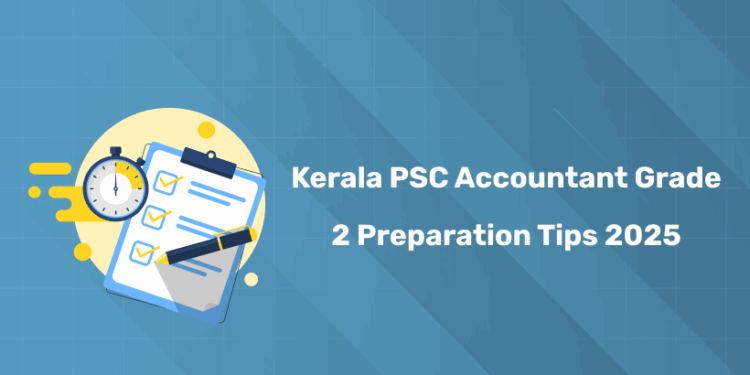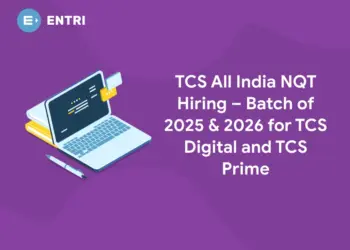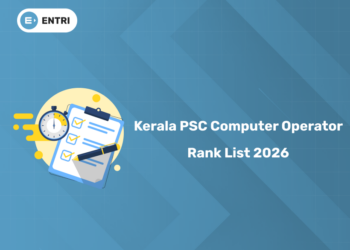Table of Contents
Kerala PSC has announced the 2025 notification for Accountant Grade 2 and related posts, with the exam date now released. With applications open, it’s the perfect time to start your preparation. In this blog, we share essential preparation tips, strategies, and study guidance to help aspirants cover the syllabus, manage time, and ensure your chances of success.
Kerala PSC Accountant Grade 2 Notification 2025 Highlights
| Highlight | Details |
|---|---|
| Notification No. | Category No: 364/2025 |
| Posts | Accountant Gr. II, Accounts Clerk, Junior Accountant, Store Assistant Gr. II |
| Conducting Body | Kerala Public Service Commission (KPSC) |
| Number of Vacancies | Anticipated vacancies |
| Application Start Date | 15.09.2025 |
| Last Date to Apply | 15.10.2025 (up to 12:00 midnight) |
| Application Mode | Online only via Kerala PSC Thulasi Profile |
| Official Website | www.keralapsc.gov.in |
| Salary/Scale of Pay | As prescribed by the respective company/corporation/board |
| Method of Appointment | Direct Recruitment |
Kerala PSC Accountant Grade 2 Preparation Tips 2025
1: Who was the first woman President of India?
Success in this exam requires more than random studying. A proper study plan, clear strategy, and consistent practice are essential. Below, we have compiled effective preparation tips to help you organize your study.
Know the Syllabus: Begin by reviewing the full syllabus to identify every topic. It ensures you cover all subjects systematically and focus on high-weightage areas without wasting effort on less important sections.
| Module | Subject | Marks |
| 1 | Accounting | 10 Marks |
| 2 | Financial Management | 10 Marks |
| 3 | Cost Accounting | 10 Marks |
| 4 | Management | 10 Marks |
| 5 | Managerial Economics | 10 Marks |
| 6 | Company Law | 10 Mark |
| 7 | Capital Market | 10 Marks |
| 8 | Fundamentals of Income-Tax | 10 Marks |
| 9 | Marketing Management | 10 Marks |
| 10 | Auditing | 10 Marks |
Plan Your Study Time: Prepare a structured timetable dividing time between new topics, revision, and practice questions. Balanced scheduling prevents burnout and ensures consistent progress.
Use the Right Books: Refer to the recommended books for each subject. Start with fundamentals, work through examples, and gradually tackle advanced concepts. Consistent practice improves understanding and retention.
Solve Old Question Papers: Practicing previous years’ papers familiarizes you with the exam pattern and question style. It also enhances speed, accuracy, and confidence when facing similar questions during the real exam.
| Question Paper Category | |
| 099/2024 | |
| 175/2024 | |
| 081/2016 | |
| 082/2016 | |
| 031/2014 | |
| 031/2014 |
Focus on High-Weightage Topics: Identify subjects and chapters that frequently appear in past exams and give them extra attention. Prioritizing these areas can maximize your scoring potential.
Prioritize Accuracy Over Quantity: Focus on solving questions correctly rather than attempting too many. It is crucial because the exam penalizes wrong answers with negative marking.
Regular Mock Test Practice: Take online or offline mock tests to replicate exam conditions. Analyze your mistakes, track your progress, and identify weak areas to improve before the main exam.
Practice Time Management: While solving papers or mock tests, set strict time limits per section. It helps you complete the actual exam within the allotted 90 minutes without rushing.
Create Quick Revision Notes: While studying, jot down key points, formulas, and definitions. Short notes make it easier to revise quickly and ensure you remember important concepts before the exam.
Revise Regularly: Allocate specific time slots weekly for revision. Repeating key concepts multiple times strengthens memory retention and reduces last-minute stress.
Engaging with peers can help clarify doubts, share resources, and provide new strategies for solving questions efficiently. Good luck!











